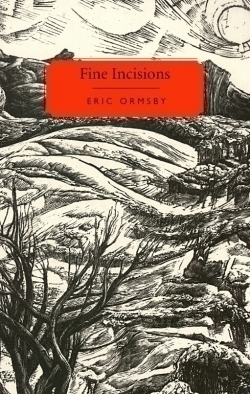Fine Incisions
Essays on Poetry and Place
- 2011 INDIES Winner
- Honorable Mention, Essays (Adult Nonfiction)
“The critic,” writes Eric Ormsby, “must stimulate curiosity but he or she must also appeal to our innate sense of justice. Like it or not, the critic is a judge…We may flinch from the ‘judgmental’ but at the same time, I think, we’re strangely elated, as well as reassured, when we see justice done, even in so small a matter as a review; it sets the world momentarily aright.”
Fine Incisions is Ormsby’s second collection of essays—critical reviews, mostly, of poets and writers—and his judicious eye is certainly at work here. One feels one is following Ormsby through his reading program, digesting the old masters in turn: Yeats, Merrill, Cavafy, Maxwell, Porter, Tolstoy. He is no toady; as he writes about Elizabeth Bishop: “Still, it should be possible to admire Bishop’s genuine, and considerable, achievement without treating her every scribble as holy writ.”
This stance is perhaps why Ormsby is described as “occasionally fractious” on the book’s blurb. If standing for old-fashioned standards in an age when every opinion is assigned equal value makes Ormsby fractious, then so be it. But his scholarship, his evident love of language, and his tone—opinions offered straight up without condescension or buttering up—lend credibility to his discernments. The range of his interests adds to his trustworthiness; he does not appear to be issuing judgments from an ivory tower. Whether or not Bob Dylan is a poet interests him as much as the “ethically seamless” world of animals and people in Jean de La Fontaine’s fables. He stands for another old-fashioned idea: books are not just for consuming, but for thinking about. Reading these essays will likely have the reader scribbling a new list of books to read, and Fine Incisions is the kind of book one wants to have handy for companionable reference.
Ormsby’s accomplishments are varied: Widely published as a journalist covering history, science, natural history, and religion, he is the author of six poetry collections, and an academic specializing in Islamist thought who has served at Princeton, McGill, and at the Institute of Ismaili Studies. His vita and the persuasive force of his writing amply qualify him as a critic.
But there’s more. As the collection progresses, Ormsby’s pilgrim soul comes into sharper focus. For him, words, like the tales of Shaharazad, “set the world right again before we sleep. They stand like fabulous cities against the encroachments of the dark.” He searches Morocco for the poet Ahmad al-Majâtî, whose lines seem to fall easily from the lips of Moroccans, but who, and whose books, are nowhere to be found. And then, in “The Happiest Man in Morroco,” Ormsby is taken to meet “a pure soul,” an an-nafs azzakiya, named Abd as-Slam, living in poverty in a cubbyhole above the market. Ormsby is captivated by the man’s simple intensity of attention.
Ormsby has just seen the exquisite ruin of Morocco’s Royal Library, a symbol of the destruction that awaits even the mighty. He muses, “where is there now, anywhere, a book whose magic will safeguard us?” And “in the presence of this ‘pure soul’…I found nothing of what books had prepared me for.” Ormsby perceives as-Slam’s happiness, perhaps the “strangest and least understood” of emotions, and that happiness stays with him “like the piercing after-fragrance of some rare perfume.”
In this move beyond books, Ormsby subtly shifts the entire collection; not only a companion for a literary life, it has something to say about life itself.
Reviewed by
Teresa Scollon
Disclosure: This article is not an endorsement, but a review. The publisher of this book provided free copies of the book and paid a small fee to have their book reviewed by a professional reviewer. Foreword Reviews and Clarion Reviews make no guarantee that the publisher will receive a positive review. Foreword Magazine, Inc. is disclosing this in accordance with the Federal Trade Commission’s 16 CFR, Part 255.

